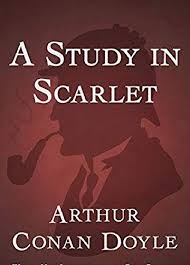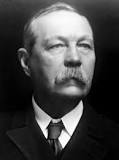A Study in Scarlet Page #3
A Study in Scarlet is an 1887 detective novel by Scottish author Arthur Conan Doyle. The story marks the first appearance of Sherlock Holmes and Dr. Watson, who would become the most famous detective duo in popular fiction.
“Do you include violin-playing in your category of rows?” he asked, anxiously. “It depends on the player,” I answered. “A well-played violin is a treat for the gods--a badly-played one----” “Oh, that’s all right,” he cried, with a merry laugh. “I think we may consider the thing as settled--that is, if the rooms are agreeable to you.” “When shall we see them?” “Call for me here at noon to-morrow, and we’ll go together and settle everything,” he answered. “All right--noon exactly,” said I, shaking his hand. We left him working among his chemicals, and we walked together towards my hotel. “By the way,” I asked suddenly, stopping and turning upon Stamford, “how the deuce did he know that I had come from Afghanistan?” My companion smiled an enigmatical smile. “That’s just his little peculiarity,” he said. “A good many people have wanted to know how he finds things out.” “Oh! a mystery is it?” I cried, rubbing my hands. “This is very piquant. I am much obliged to you for bringing us together. ‘The proper study of mankind is man,’ you know.” “You must study him, then,” Stamford said, as he bade me good-bye. “You’ll find him a knotty problem, though. I’ll wager he learns more about you than you about him. Good-bye.” “Good-bye,” I answered, and strolled on to my hotel, considerably interested in my new acquaintance. CHAPTER II. THE SCIENCE OF DEDUCTION. WE met next day as he had arranged, and inspected the rooms at No. 221B, [5] Baker Street, of which he had spoken at our meeting. They consisted of a couple of comfortable bed-rooms and a single large airy sitting-room, cheerfully furnished, and illuminated by two broad windows. So desirable in every way were the apartments, and so moderate did the terms seem when divided between us, that the bargain was concluded upon the spot, and we at once entered into possession. That very evening I moved my things round from the hotel, and on the following morning Sherlock Holmes followed me with several boxes and portmanteaus. For a day or two we were busily employed in unpacking and laying out our property to the best advantage. That done, we gradually began to settle down and to accommodate ourselves to our new surroundings. Holmes was certainly not a difficult man to live with. He was quiet in his ways, and his habits were regular. It was rare for him to be up after ten at night, and he had invariably breakfasted and gone out before I rose in the morning. Sometimes he spent his day at the chemical laboratory, sometimes in the dissecting-rooms, and occasionally in long walks, which appeared to take him into the lowest portions of the City. Nothing could exceed his energy when the working fit was upon him; but now and again a reaction would seize him, and for days on end he would lie upon the sofa in the sitting-room, hardly uttering a word or moving a muscle from morning to night. On these occasions I have noticed such a dreamy, vacant expression in his eyes, that I might have suspected him of being addicted to the use of some narcotic, had not the temperance and cleanliness of his whole life forbidden such a notion. As the weeks went by, my interest in him and my curiosity as to his aims in life, gradually deepened and increased. His very person and appearance were such as to strike the attention of the most casual observer. In height he was rather over six feet, and so excessively lean that he seemed to be considerably taller. His eyes were sharp and piercing, save during those intervals of torpor to which I have alluded; and his thin, hawk-like nose gave his whole expression an air of alertness and decision. His chin, too, had the prominence and squareness which mark the man of determination. His hands were invariably blotted with ink and stained with chemicals, yet he was possessed of extraordinary delicacy of touch, as I frequently had occasion to observe when I watched him manipulating his fragile philosophical instruments. The reader may set me down as a hopeless busybody, when I confess how much this man stimulated my curiosity, and how often I endeavoured to break through the reticence which he showed on all that concerned himself. Before pronouncing judgment, however, be it remembered, how objectless was my life, and how little there was to engage my attention. My health forbade me from venturing out unless the weather was exceptionally genial, and I had no friends who would call upon me and break the monotony of my daily existence. Under these circumstances, I eagerly hailed the little mystery which hung around my companion, and spent much of my time in endeavouring to unravel it. He was not studying medicine. He had himself, in reply to a question, confirmed Stamford’s opinion upon that point. Neither did he appear to have pursued any course of reading which might fit him for a degree in science or any other recognized portal which would give him an entrance into the learned world. Yet his zeal for certain studies was remarkable, and within eccentric limits his knowledge was so extraordinarily ample and minute that his observations have fairly astounded me. Surely no man would work so hard or attain such precise information unless he had some definite end in view. Desultory readers are seldom remarkable for the exactness of their learning. No man burdens his mind with small matters unless he has some very good reason for doing so. His ignorance was as remarkable as his knowledge. Of contemporary literature, philosophy and politics he appeared to know next to nothing. Upon my quoting Thomas Carlyle, he inquired in the naivest way who he might be and what he had done. My surprise reached a climax, however, when I found incidentally that he was ignorant of the Copernican Theory and of the composition of the Solar System. That any civilized human being in this nineteenth century should not be aware that the earth travelled round the sun appeared to be to me such an extraordinary fact that I could hardly realize it. “You appear to be astonished,” he said, smiling at my expression of surprise. “Now that I do know it I shall do my best to forget it.” “To forget it!” “You see,” he explained, “I consider that a man’s brain originally is like a little empty attic, and you have to stock it with such furniture as you choose. A fool takes in all the lumber of every sort that he comes across, so that the knowledge which might be useful to him gets crowded out, or at best is jumbled up with a lot of other things so that he has a difficulty in laying his hands upon it. Now the skilful workman is very careful indeed as to what he takes into his brain-attic. He will have nothing but the tools which may help him in doing his work, but of these he has a large assortment, and all in the most perfect order. It is a mistake to think that that little room has elastic walls and can distend to any extent. Depend upon it there comes a time when for every addition of knowledge you forget something that you knew before. It is of the highest importance, therefore, not to have useless facts elbowing out the useful ones.”
Translation
Translate and read this book in other languages:
Select another language:
- - Select -
- 简体中文 (Chinese - Simplified)
- 繁體中文 (Chinese - Traditional)
- Español (Spanish)
- Esperanto (Esperanto)
- 日本語 (Japanese)
- Português (Portuguese)
- Deutsch (German)
- العربية (Arabic)
- Français (French)
- Русский (Russian)
- ಕನ್ನಡ (Kannada)
- 한국어 (Korean)
- עברית (Hebrew)
- Gaeilge (Irish)
- Українська (Ukrainian)
- اردو (Urdu)
- Magyar (Hungarian)
- मानक हिन्दी (Hindi)
- Indonesia (Indonesian)
- Italiano (Italian)
- தமிழ் (Tamil)
- Türkçe (Turkish)
- తెలుగు (Telugu)
- ภาษาไทย (Thai)
- Tiếng Việt (Vietnamese)
- Čeština (Czech)
- Polski (Polish)
- Bahasa Indonesia (Indonesian)
- Românește (Romanian)
- Nederlands (Dutch)
- Ελληνικά (Greek)
- Latinum (Latin)
- Svenska (Swedish)
- Dansk (Danish)
- Suomi (Finnish)
- فارسی (Persian)
- ייִדיש (Yiddish)
- հայերեն (Armenian)
- Norsk (Norwegian)
- English (English)
Citation
Use the citation below to add this book to your bibliography:
Style:MLAChicagoAPA
"A Study in Scarlet Books." Literature.com. STANDS4 LLC, 2025. Web. 5 Feb. 2025. <https://www.literature.com/book/a_study_in_scarlet_287>.








Discuss this A Study in Scarlet book with the community:
Report Comment
We're doing our best to make sure our content is useful, accurate and safe.
If by any chance you spot an inappropriate comment while navigating through our website please use this form to let us know, and we'll take care of it shortly.
Attachment
You need to be logged in to favorite.
Log In